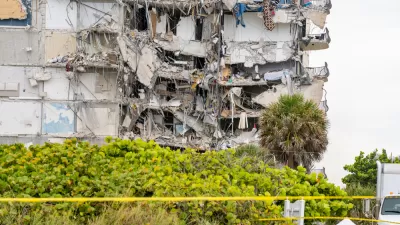A coastal geologist urges state leaders and residents to start planning for 'managed retreat' away from the coastal communities most vulnerable to sea level rise.

While climate change may not be directly related to the partial collapse in June of a condo building in Surfside, Florida, "the collapse has shone a spotlight on Florida’s unique vulnerabilities to climate change and raised questions about whether the state’s coastal infrastructure is equipped to handle the flooding that comes with sea-level rise." Zoya Teirstein interviews Randall W. Parkinson, a coastal geologist at Florida International University in Miami, who "thinks it’s already time to start thinking about moving residents away from the sea."
"By 2050," says Parkinson, "buildings in South Florida may be inundated by 2 to 3 feet of sea-level rise, plus 4 or more feet of storm surge." To him, "the collapse was a bellwether moment or a tipping point in the conversation, where for the first time, many more people are thinking more seriously about climate change in the coastal zone." Despite a reluctance on the part of most Floridians to consider managed retreat, Parkinson says the conversation is more essential than ever. "[T]hese current plans, they might hold the line for the next 30 years or so, but it’s just going to be untenable after that. And people are going to have to begin to make plans for how to withdraw and to ensure equity in the transition."
"Preventing future tragedies means acting now," Parkinson says. Otherwise, state and local leaders risk "having to make that decision when you have a major catastrophe." Floridians now face a critical decision: "You do nothing, you adapt (which is a temporary fix because eventually these low-lying coastal areas are all going to be underwater), or, at some point, people are going to have to think about a managed withdrawal from the coastline. Right now, it wouldn’t be managed; it would be total chaos."
FULL STORY: The Surfside tragedy could be a ‘bellwether moment’ for managed retreat

Planetizen Federal Action Tracker
A weekly monitor of how Trump’s orders and actions are impacting planners and planning in America.

San Francisco's School District Spent $105M To Build Affordable Housing for Teachers — And That's Just the Beginning
SFUSD joins a growing list of school districts using their land holdings to address housing affordability challenges faced by their own employees.

The Tiny, Adorable $7,000 Car Turning Japan Onto EVs
The single seat Mibot charges from a regular plug as quickly as an iPad, and is about half the price of an average EV.

As Trump Phases Out FEMA, Is It Time to Flee the Floodplains?
With less federal funding available for disaster relief efforts, the need to relocate at-risk communities is more urgent than ever.

With Protected Lanes, 460% More People Commute by Bike
For those needing more ammo, more data proving what we already knew is here.

In More Metros Than You’d Think, Suburbs are Now More Expensive Than the City
If you're moving to the burbs to save on square footage, data shows you should think again.
Urban Design for Planners 1: Software Tools
This six-course series explores essential urban design concepts using open source software and equips planners with the tools they need to participate fully in the urban design process.
Planning for Universal Design
Learn the tools for implementing Universal Design in planning regulations.
Smith Gee Studio
City of Charlotte
City of Camden Redevelopment Agency
City of Astoria
Transportation Research & Education Center (TREC) at Portland State University
US High Speed Rail Association
City of Camden Redevelopment Agency
Municipality of Princeton (NJ)




























